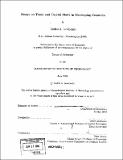Essays on trade and capital flows in developing countries
Author(s)
Levchenko, Andrei A., 1977-
DownloadFull printable version (4.528Mb)
Other Contributors
Massachusetts Institute of Technology. Dept. of Economics.
Advisor
Daron Acemoglu.
Terms of use
Metadata
Show full item recordAbstract
This thesis is a collection of essays on the effects of trade and capital flows in developing countries. Chapter 1 starts with the observation that institutions - contract enforcement, property rights, investor protection, and the like - have received a great deal of attention in recent years. I propose a simple model of international trade in which institutional differences are modeled within the Grossman-Hart-Moore framework of contract incompleteness. I show that doing so yields several surprising conclusions. Institutional differences imply, among other things, that the less developed country may not gain from trade, and factor prices may actually diverge as a result of trade. Then I test empirically whether institutions act as a source of trade, using data on 1998 US imports disaggregated by country and industry. The empirical results provide evidence of "institutional content of trade:" institutional differences are an important determinant of trade flows. Chapter 2 focuses instead on capital flows. Recent empirical evidence demonstrates that in developing countries, financial liberalization is associated with an increase in consumption volatility. In this chapter I seek to rationalize the evidence by linking it to two important features of developing countries. First, domestic financial markets are underdeveloped. Second, access to international markets is not available to all members of society. I show that in this environment, opening up to international markets reduces the amount of risk sharing attained at home and can raise the volatility of consumption. (cont.) financial development. In our model, a country's financial development arises endogenously as an outcome of domestic demand for external finance. If poor countries import financially dependent goods rather than produce them domestically, financially intensive sectors shrink in the poor country, demand for external finance decreases and the domestic financial system deteriorates. We test our model using data on financial development for a sample of 77 countries. We find that trade openness is associated with faster financial development in wealthier countries, and with slower financial development in poorer ones.
Description
Thesis (Ph. D.)--Massachusetts Institute of Technology, Dept. of Economics, 2004. Includes bibliographical references and index.
Date issued
2004Department
Massachusetts Institute of Technology. Department of EconomicsPublisher
Massachusetts Institute of Technology
Keywords
Economics.